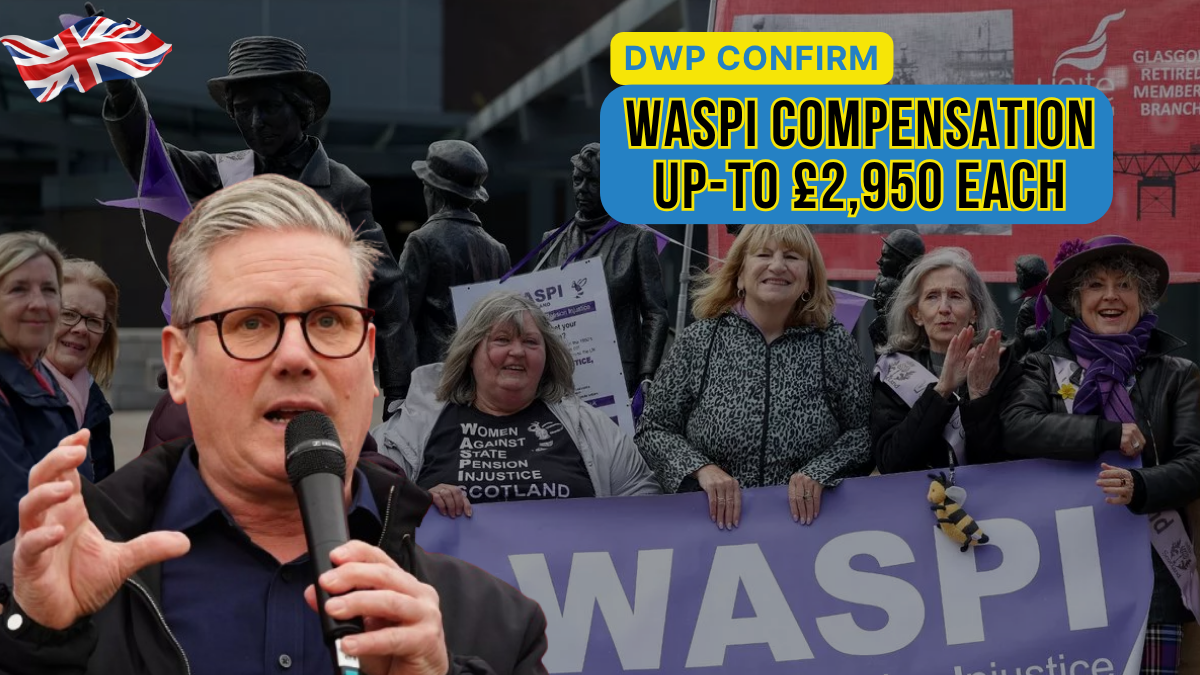A critical legal review is underway that may impact millions of women born in the 1950s who were adversely affected by changes to the UK State Pension age. These women, represented by the WASPI (Women Against State Pension Inequality) campaign, are awaiting a High Court decision that could allow them to seek compensation of up to £2,950 each from the Department for Work and Pensions (DWP).

This potential payout stems from allegations that the DWP failed to provide adequate and timely notification regarding the increase in the pension age, resulting in widespread financial hardship and emotional stress among the affected group.
Summary Table: WASPI Compensation up-to £2,950 EACH
Area |
Details |
|---|---|
Campaign Name |
Women Against State Pension Inequality (WASPI) |
Legal Focus |
DWP’s maladministration in notifying about pension age changes |
Potential Payout |
Up to £2,950 per woman |
Estimated Affected |
Approximately 3.8 million women born in the 1950s |
Key Legal Hurdle |
High Court decision on cost-capping |
Government Stance |
Acknowledges delays, denies compensation |
Official Site |
Origins of the WASPI Campaign
The WASPI campaign began as a response to two pivotal pieces of legislation: the Pensions Act 1995 and the Pensions Act 2011. These acts were intended to equalise the State Pension age for men and women. However, many women born in the 1950s were not adequately informed of how these changes would impact their retirement plans.
Instead of receiving early notice, thousands of women only learned about the changes a year or two before reaching 60, the age at which they had expected to retire. This left many financially unprepared and forced to:
- Work for longer than anticipated
- Draw down savings prematurely
- Take on additional debt
This movement, led by figures such as Angela Madden, has grown into a national campaign demanding government accountability and financial redress.
Legal Background: DWP’s Maladministration
In 2021, the Parliamentary and Health Service Ombudsman (PHSO) ruled that the DWP had committed maladministration by failing to properly notify women of the pension age increase. However, while the Ombudsman acknowledged the injustice, it did not recommend financial compensation, creating frustration and uncertainty among affected women.
Instead, the WASPI campaign has turned to the legal system, hoping for a High Court ruling that would open the path to direct compensation.
Eligibility and Potential Compensation
If the court rules in favour of the WASPI campaign, up to 3.8 million women could become eligible for compensation. Though the final amount has not been formally confirmed, estimates place the maximum individual payout at £2,950.
This figure reflects financial loss and emotional distress, calculated from previous parliamentary debates and reports concerning the impact of poor communication.
Estimated Financial Scope
Category |
Estimate |
|---|---|
Women Affected |
Approx. 3.8 million |
Maximum Payment |
Up to £2,950 per person |
Total Government Cost |
Over £11 billion |
Status |
Awaiting High Court ruling |
Government Position on Compensation
Despite increasing public and political pressure, the DWP has rejected calls for compensation. In a public statement, the department admitted to communication delays of up to 28 months but did not accept the Ombudsman’s recommendation for redress through financial payments.
The DWP claims it has apologised for the delays and acknowledges the hardship, but it disputes the level of injustice and does not believe financial compensation is appropriate. This resistance has forced the WASPI campaign into an expensive and time-consuming legal process, relying largely on public fundraising and grassroots support.
Upcoming Legal Developments
The next few weeks will prove critical in shaping the outcome of this high-stakes legal fight. Several key developments are expected:
1. High Court Ruling on Cost-Capping
This will determine whether the WASPI campaign has the financial capacity to continue the legal proceedings. A positive ruling would allow the campaign to move forward; a negative one may lead to alternative legal strategies or appeals.
2. Fundraising and Support Mobilisation
The campaign may need to intensify fundraising efforts to meet the legal costs associated with challenging the DWP in court.
3. Possible Parliamentary Debate
Depending on public sentiment and political leadership, a renewed debate in Parliament could reignite interest in finding a legislative resolution.
4. Appeal Scenarios
If the High Court rules against WASPI on cost grounds, campaign leaders may escalate the case through additional legal channels or seek alternative remedies.
What Happens If WASPI Wins?
A ruling in WASPI’s favour would set a major legal precedent. It could open the door for similar actions related to government communication failures and potentially influence how future pension-related changes are handled.
It would also be seen as a vindication for grassroots activism, proving that large-scale citizen movements can challenge government departments and achieve financial justice.
Frequently Asked Questions (FAQs)
Q: How much compensation could each affected woman receive?
A: Up to £2,950 per person, subject to the court’s ruling and available funds.
Q: What is the WASPI campaign demanding?
A: Financial compensation and formal acknowledgment for women born in the 1950s who were not properly informed about the increase in the State Pension age.
Q: Has the DWP agreed to compensate the women affected?
A: No. While the DWP has acknowledged communication delays, it refuses to offer financial compensation.
Q: How many women are affected by this issue?
A: An estimated 3.8 million women across the UK.
Q: Where can I find official updates on the WASPI campaign?
A: Visit the official WASPI site at https://www.waspi.co.uk.
For More Information Click HERE